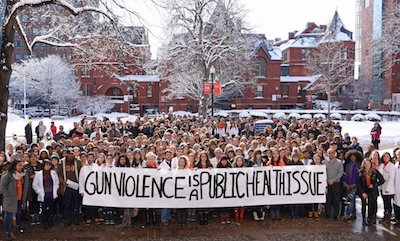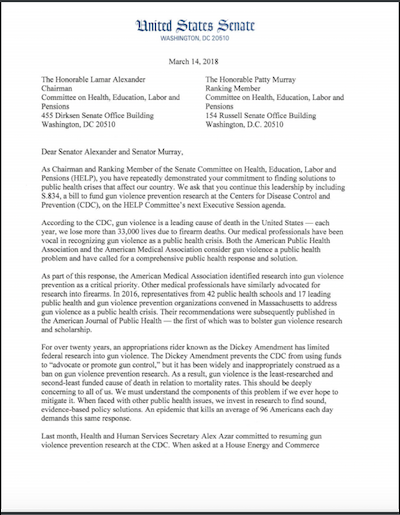SPH and Guns.
 On March 11, the School of Public Health will co-host “Tackling Gun Violence,” a conversation with Massachusetts Governor Charlie Baker, Speaker of the House Robert A. DeLeo, and Attorney General Maura Healey.
On March 11, the School of Public Health will co-host “Tackling Gun Violence,” a conversation with Massachusetts Governor Charlie Baker, Speaker of the House Robert A. DeLeo, and Attorney General Maura Healey.
These state leaders will be joined by Boston high-schooler and March for Our Lives activist Vikiana Petit-Homme, Marjory Stoneman Douglas Parkland High School shooting survivor and activist Sam Zeif, Boston Globe columnist Nestor Ramos, Stop Handgun Violence chair John Rosenthal, and Dean Sandro Galea, in a panel moderated by WBUR senior correspondent Deborah Becker and co-hosted by WBUR’s CitySpace and the Boston Globe.
The event is one in a series of conversations and efforts around guns convened by SPH over the last four years, as the school has become a leader in the push for gun deaths and injuries to be recognized as a public health issue that demands extensive research and bold policy.
“This is an epidemic that kills over 32,000 people in the US each year, and injures over 200,000 more,” Galea says. But an effective public health response has been hampered for decades by government actions fueled by the National Rifle Association (NRA), particularly policies that have defunded federal gun research. Because of this funding environment, “researchers know less about how to curb gun violence than we would if we had 32,000 people dying from an infectious disease,” he says.
Despite an environment that has long discouraged researchers and practitioners from speaking out about guns, “it falls to academic public health to organize itself in a way that will allow us to be a clear and compelling voice on the issue,” Galea says. “SPH has taken the lead in envisioning how an activist academic public health community can tackle gun violence.”
To that end, in November 2016, SPH convened an unprecedented gathering of deans and faculty from 42 public health schools across the nation to discuss the need to draw more attention and resources to the issue. The forum also included representatives of 17 other public health, government, and advocacy organizations, including DeLeo, Healey, and Rosenthal.

After the forum, a group of deans and other participants published an editorial, “Academic Public Health and the Firearm Crisis: An Agenda for Action,” in a special 2017 gun control issue of the American Journal of Public Health (AJPH). The first item on that agenda was an end to the Dickey Amendment, an appropriations rider that for decades has prevented the Centers for Disease Control and Prevention (CDC) from using funds to research gun violence prevention—and, under some presidential administrations’ interpretations, has banned such research from the CDC outright.
In early 2018, this editorial was cited in a letter from 26 US senators to the Senate Committee on Health, Education, Labor and Pensions, calling for funding for gun violence research at the CDC. A week later, a deal made in Congress allowed the CDC to again research gun violence prevention (as it did under the Obama Administration), although the Dickey Amendment still prevents the CDC from using appropriated funds to do so.
Despite funding challenges, SPH has made gun research a priority, and researchers have been prolific in their contributions to understanding the issue. They have identified the gun control policies that save the most lives, and created a comprehensive national database to track the effects of gun laws in real time. They have shown again and again that a greater prevalence of gun ownership comes with more gun deaths, particularly in murders of women and in adolescent suicide. They have discredited the argument that gun control does not work because many places with strong gun control legislation still see considerable gun violence. They have identified the years that guns have taken off of American life expectancy, and the long-term tolls faced by survivors. They have also examined how gun violence relates to structural racism, and examined the predictors and wider mental health toll of police shootings of unarmed African Americans.

“Funding-wise, yes, it’s challenging, but at the same time it’s very meaningful,” said Ziming Xuan, associate professor of community health sciences, in a 2016 interview. “You’re rewarded… in the value that your research is going to provide to inform people who are going to make decisions and policies to help the population at large. It’s rewarding indeed.”
SPH researchers, as well as students and other members of the school community, have also sought to communicate to the broader public through communications campaigns, publishing newspaper editorials, and participating in protests and marches.
Guns have regularly been the focus of seminars, fora, symposia, and workshops at the school since 2015. These events have not been all talk, but rather springboards to action—if not actions themselves. For example, the Dean’s Seminar “#ENOUGH: Community Forum on Gun Violence,” co-hosted by the Activist Lab soon after the Parkland shooting in 2018, ended with a phone bank where audience members called their legislators using scripts and lists of policy positions to discuss.
The Activist Lab has also made gun safety a focus of its series of advocacy workshops. From March 15 to 17, the Activist Lab will co-host the Gun Violence Prevention Regional Student Summit with Stop Handgun Violence and March for Our Lives: Boston. The summit is part of a nationwide, multi-location event gathering high-school students, advocates, policymakers, and researchers to continue activism around guns one year after the March for Our Lives.
“We saw the 2016 forum help push the needle forward on this issue,” Galea says. “That forum was the first of its kind, as the upcoming gathering of bipartisan Massachusetts leaders to discuss this issue will be, to our knowledge, the first of its kind. I hope this convening—and all of the other work on guns that we are doing here at SPH—will help produce the kind of action needed to end this epidemic.”